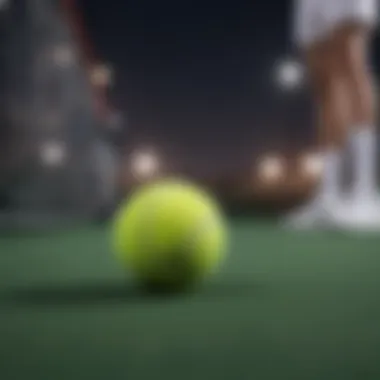Unveiling the Intricacies of Tennis Psychology: Delving into Players' Mental Dynamics


Book Title and Author Introduction
When delving into the world of tennis psychology, one cannot overlook the groundbreaking book 'Mind Games in Tennis' by Dr. A. Patel, a seasoned sports psychologist with a wealth of experience in mental training for elite athletes. Dr. Patel's work explores the intricate interplay between the mind and performance on the tennis court, offering a revolutionary perspective on unlocking the mental aspects of the game.
Summary of Book Content
In 'Mind Games in Tennis,' Dr. Patel dissects the mental strategies and emotional resilience that differentiate successful players from the rest. His exploration extends beyond conventional wisdom, delving into the subconscious patterns that govern on-court decisions and behaviors. One of the key passages that encapsulates the essence of the book states, 'Success in tennis is not just about hitting the ball but mastering the battlefield of one's mind.' This underscores the pivotal role of mental fortitude in shaping a player's success.
Three Lessons Learned
- Lesson 1: The importance of mindfulness in enhancing focus and concentration during high-pressure moments on the court. Dr. Patel emphasizes the power of being present in the moment to execute precise shots and strategic plays.
- Lesson 2: Building emotional resilience to navigate setbacks and challenges gracefully. This lesson sheds light on how top athletes harness their emotions to fuel motivation rather than hinder performance.
- Lesson 3: Utilizing visualization techniques to optimize performance outcomes. The book delves into visualization as a tool for mentally rehearsing plays and honing decision-making skills under varied circumstances.
Practical Applications
The lessons drawn from 'Mind Games in Tennis' are not confined to the court but extend to real-life scenarios where mental strength and emotional intelligence play crucial roles. Implementing mindfulness practices in daily routines can enhance focus and productivity, while mastering emotional resilience can equip individuals to handle adversities with grace and composure. Visualization techniques can be applied not only in sports but also in professional settings to boost confidence and performance.
Introduction to the Inner Mind of Tennis
Understanding the Psychological Landscape
The Power of Mental Toughness
Delving into the realm of mental toughness within the context of tennis unveils a fascinating dimension of player performance. Defined by resilience, determination, and unwavering focus, mental toughness stands as a cornerstone in achieving success on the court. In this article, we explore the significance of mental toughness as a driving force behind overcoming challenges and maintaining peak performance levels during pivotal moments of a match. The unique feature of mental toughness lies in its ability to fortify a player's resolve under pressure, enabling them to thrive in high-stakes situations. While the advantages of mental toughness are clear in enhancing composure and tenacity, there may be challenges in balancing its intensity to avoid burnout, a crucial aspect we dissect further in this discussion.
The Role of Focus and Concentration
Undeniably, focus and concentration are linchpins in the mental arsenal of tennis players. The ability to block out distractions, hone in on strategic gameplay, and maintain a sharp mental acuity throughout a match sets the top-tier performers apart from the rest. Highlighting the essence of focus and concentration in our narrative, we emphasize the pivotal role these attributes play in shaping a player's decision-making, anticipation, and overall performance consistency on the court. While the advantages of heightened focus are manifold, challenges such as diverting attention and combating mental fatigue merit careful consideration in optimizing this mental faculty for sustained success on the tennis court.
The Influence of Confidence and Self-Belief
Confidence and self-belief serve as beacons guiding a player through the competitive landscape of tennis. In this section, we delve into the nuances of how belief in one's abilities can fuel performance levels and serve as a catalyst for achieving goals. Confidence breeds resilience in the face of adversity and instills a sense of unwavering self-trust that can be transformative on the court. Examining the significance of confidence and self-belief, we underscore the cruciality of this psychological attribute in shaping a player's mindset, approach to challenges, and overall performance trajectory. However, challenges such as self-doubt and external pressures may pose hurdles in maintaining a consistent level of confidence, a facet we navigate through in our exploration to provide a holistic perspective on this critical aspect.
Strategies for Mental Mastery on the Tennis Court


Strategies for mental mastery on the tennis court play a pivotal role in optimizing player performance and success. In this section, we delve into the significance of honing mental skills alongside physical abilities to excel in the game of tennis. Understanding how mental strategies can influence outcomes is essential for players looking to elevate their game to the next level. By implementing specific techniques geared towards mental fortitude and focus, athletes can navigate the challenges of competition with resilience and precision.
Visualizing Success and Goal Setting
The Art of Visualization
The art of visualization holds a paramount position in the realm of mental mastery on the tennis court. Visualizing success involves mentally picturing oneself achieving desired outcomes, whether it be executing a flawless serve or returning a challenging shot. This practice aids in honing concentration, boosting confidence, and enhancing overall performance. Athletes harness the power of visualization to create a mental blueprint for success, enhancing their ability to translate thoughts into actions on the court effectively.
Setting SMART Goals
Setting SMART (Specific, Measurable, Achievable, Relevant, Time-bound) goals is a cornerstone of mental mastery in tennis. By establishing clear and structured objectives, players can direct their focus towards tangible achievements. SMART goals provide a roadmap for progression, allowing athletes to track their development and stay motivated throughout their training and competitions. This strategic approach to goal-setting fosters consistency, determination, and continuous improvement in the pursuit of excellence.
Creating Positive Affirmations
Integrating positive affirmations into mental training routines is a potent tool for maintaining a resilient mindset on the tennis court. Positive affirmations are encouraging statements that uplift the spirit, instill belief, and cultivate a mindset of success. By regularly affirming positive thoughts and self-assurance, players enhance their mental strength, overcome self-doubt, and stay motivated in challenging situations. Embracing the practice of positive affirmations fosters a constructive inner dialogue that empowers athletes to perform at their best level consistently.
Developing a Resilient Mindset
Embracing Failure as a Learning Opportunity
Embracing failure as a learning opportunity is a fundamental aspect of developing a resilient mindset in tennis. Viewing setbacks as stepping stones for growth shifts the perspective from defeat to valuable experience. By extracting lessons from failures, players gain invaluable insights, refine their skills, and strengthen their mental resolve. Embracing failure as a learning opportunity cultivates humility, resilience, and a growth-oriented approach towards continuous improvement.
Practicing Mindfulness and Meditation
The practice of mindfulness and meditation serves as a potent tool for nurturing a resilient mindset in tennis. Mindfulness cultivates present-moment awareness, allowing players to stay focused, composed, and attentive during matches. Incorporating meditation techniques enhances mental clarity, reduces stress, and promotes emotional balance on the court. By embracing mindfulness and meditation, athletes develop mental discipline, emotional resilience, and a heightened sense of self-awareness, fostering peak performance under pressure.
Enhancing Mental Endurance
Enhancing mental endurance is a vital component of developing a resilient mindset for long-term success in tennis. Mental endurance enables players to sustain focus, determination, and motivation throughout intense matches and extended training sessions. By honing mental endurance through targeted exercises and mindset strategies, athletes bolster their capacity to overcome challenges, persevere through adversity, and thrive in competitive environments. Strengthening mental endurance is central to building psychological resilience and achieving consistent peak performance in tennis.
The Intersection of Physical and Mental Training
In the multifaceted realm of tennis psychology, the fusion of physical prowess and mental fortitude plays a pivotal role. The interplay between the body's technical skills and the mind's preparation is a delicate yet indispensable balance that shapes a player's performance on the court. Understanding the subtleties of how mental agility complements physical dexterity can be the differentiator in high-stakes matches, separating the good from the great.
Balancing Technical Skills with Mental Preparation


Integrating Mental Drills into Practice Sessions
Integrating Mental Drills into Practice Sessions serves as a cornerstone in honing the psychological acuity required for top-tier tennis performance. By incorporating drills that challenge cognitive functions, decision-making under duress, and maintaining focus amidst distractions, players cultivate a resilient mindset essential for competitive success. These drills not only refine mental dexterity but also enhance emotional control and strategic thinking, offering a holistic approach to player development.
Utilizing Breathing Techniques for Focus
The significance of Utilizing Breathing Techniques for Focus lies in its ability to synchronize mind and body, fostering a state of deep concentration and composure during intense rallies. By implementing controlled breathing patterns, players can regulate their heart rate, quell nervousness, and channel their focus on the present moment, optimizing performance under pressure. This technique not only calms the nerves but also enhances clarity of thought, decision-making, and overall mental composure, crucial for navigating the challenges of competitive play.
Optimizing Pre-Match Rituals
Optimizing Pre-Match Rituals represents the ceremonial aspect of mental preparation, setting the tone for upcoming battles on the court. Establishing personalized rituals before a match instills a sense of routine, comfort, and confidence, priming the mind for peak performance. Whether it involves visualization exercises, music playlists, or specific warm-up routines, these rituals serve as anchor points for players, anchoring them in a positive mental state that translates to focused and composed gameplay.
Holistic Approach to Player Development
The concept of Holistic Approach to Player Development encompasses a comprehensive strategy that considers the interconnectedness of physical, mental, and emotional facets in optimizing athletic performance. By embracing a holistic approach, players can transcend technical proficiency and delve into mental agility, emotional resilience, and physical well-being, creating a robust foundation for sustained success in competitive tennis.
Incorporating Cross-Training for Mental Agility
Incorporating Cross-Training for Mental Agility advocates for a diverse training regimen that challenges various cognitive functions outside the traditional tennis domain. By engaging in mental exercises such as puzzles, memory games, and problem-solving tasks, players stimulate neural pathways, enhance focus, and foster adaptability in high-pressure situations, fortifying their mental arsenal for on-court challenges.
Rest and Recovery for Mental Refreshment
Rest and Recovery for Mental Refreshment underscore the imperative role of downtime in maintaining optimal mental acuity and emotional equilibrium. Adequate rest periods between training sessions and matches allow players to recharge not just physically but also mentally, preventing burnout and fostering sustained motivation. By prioritizing restorative practices such as sufficient sleep, relaxation techniques, and mindfulness exercises, players can rejuvenate their cognitive faculties, enhancing decision-making and overall mental resilience.
Nutritional Strategies for Cognitive Function
Nutritional Strategies for Cognitive Function delves into the vital connection between diet and mental performance, emphasizing the profound impact of nutrition on cognitive function and emotional stability. By fueling the body with nutrient-dense foods rich in antioxidants, Omega-3 fatty acids, and essential vitamins and minerals, players can optimize brain health, combat mental fatigue, and sustain focus and concentration throughout long matches. This segment further explores the role of hydration, timing of meals, and nutritional supplements in promoting alertness, mental clarity, and sustained energy levels, elevating players' cognitive capabilities on the court.
Psychological Resilience in Competitive Settings
Psychological resilience is a pivotal aspect in the intricate realm of tennis psychology. It revolves around the player's ability to navigate challenging situations on the court with mental fortitude and emotional composure. In this article, we delve deep into the significance of Psychological Resilience in Competitive Settings, examining how it can elevate players' performance beyond physical skills. By honing psychological resilience, tennis athletes can enhance their capacity to react effectively to adversity, maintain inner calm during high-pressure moments, and channel setbacks into motivational drivers for long-term success. The exploration of Psychological Resilience in Competitive Settings sheds light on the holistic approach to player development in the competitive domain, emphasizing the fusion of mental and technical skills to achieve peak performance.
Adapting to Adversity on the Court
Reacting Positively to Unexpected Challenges


Reacting Positively to Unexpected Challenges plays a fundamental role in fortifying a player's mental resilience. This cognitive skill enables tennis athletes to confront unforeseen obstacles with optimism and adaptability, fostering mental flexibility and strategic ingenuity on the court. The essence of Reacting Positively to Unexpected Challenges lies in training the mind to perceive setbacks as opportunities for growth rather than deterrents to success. By cultivating this mindset, players can cultivate a proactive approach to adversity, turning obstacles into stepping stones towards excellence in their game. The positive outlook instilled by Reacting Positively to Unexpected Challenges serves as a cornerstone of psychological resilience in competitive tennis, underlining the transformative power of a resilient mindset in the face of uncertainty and pressure.
Maintaining Composure in High-Pressure Situations
Maintaining Composure in High-Pressure Situations is a crucial skill that separates elite athletes from the competition in the realm of competitive tennis. This aspect entails the ability to control emotions, stay focused, and make sound decisions under duress, ensuring consistent performance during critical moments in a match. The hallmark of Maintaining Composure in High-Pressure Situations lies in fostering mental clarity and emotional stability when the stakes are high, empowering players to deliver their best performance when it matters most. By mastering this skill, tennis athletes can neutralize external pressures, cultivate mental strength, and execute their game plan with precision and composure, enhancing their competitive edge on the court.
Turning Setbacks into Motivation
Turning setbacks into motivation is a transformative mindset that propels athletes towards sustained growth and success in competitive tennis. This cognitive approach entails leveraging setbacks, defeats, and challenges as catalysts for renewed determination, resilience, and ultimate triumph. The art of Turning Setbacks into Motivation lies in reframing failures as valuable learning experiences, extracting lessons from defeat, and fueling personal development and performance improvement. By embracing setbacks as stepping stones to future achievements, players can harness adversity as a driving force for continuous progress, resilience, and mental fortitude on their journey towards long-term success in the fiercely competitive landscape of professional tennis.
Embracing the Inner Game of Tennis
In this pivotal section of the article, we delve into the crucial components of embracing the inner game of tennis. The significance of this topic lies in its ability to uncover the hidden dynamics that impact a player's performance from a psychological standpoint. By focusing on the internal aspects of the game, players can enhance their mental resilience, emotional intelligence, and overall mindset, ultimately leading to improved on-court performance and strategic decision-making.
Harnessing the Power of the Mind-Body Connection
Utilizing Visualization for Improved Performance
When exploring the realm of utilizing visualization for improved performance, we unravel a profound technique that champions the power of mental imagery in enhancing one's gameplay. This strategy allows players to mentally rehearse their shots, tactics, and reactions, creating a mental blueprint for success. Visualization optimizes focus, confidence, and decision-making on the court. While its benefits are well-documented, its success in this article lies in its application within the context of tennis, offering players a mental edge through vivid imagery and strategic planning.
Practicing Mindful Movement on the Court
Practicing mindful movement on the court entails a thoughtful approach to each physical action, emphasizing presence, intention, and sensorial awareness. By fostering mindfulness in movement, players can cultivate a deeper connection between their body and mind, leading to improved coordination, agility, and anticipation during gameplay. This technique enhances player concentration, adaptability, and overall performance by grounding them in the present moment and synchronizing their physical actions with their mental intentions.
Enhancing Intuition and Instinct in Play
Enhancing intuition and instinct in play is a multifaceted strategy that taps into a player's innate decision-making skills and natural athletic instincts. By honing these innate abilities, players can react swiftly, anticipate opponents' moves, and make split-second decisions with confidence. This approach empowers players to trust their intuition, read the game more effectively, and adapt to changing circumstances seamlessly. While intuitive play carries risks, its strategic application in this article lies in its ability to elevate a player's performance through spontaneity and calculated risk-taking.
Evolving Through Mental Evolution
Adapting Strategies Based on Mental Growth
Adapting strategies based on mental growth involves a continuous process of self-reflection, analysis, and refinement of one's psychological approach to the game. By adapting strategies to align with mental development, players can stay ahead of their competitors, exploit their strengths, and fortify their weaknesses. This dynamic evolution allows players to customize their gameplay, training routines, and mental strategies based on their evolving self-awareness and cognitive abilities, showcasing adaptability, resilience, and strategic prowess on the court.
Incorporating Psychological Learnings into Training
The integration of psychological learnings into training solidifies a player's holistic approach to skill development, game strategy, and mental fortitude. By infusing psychological principles into their training regimen, players can bridge the gap between theory and practice, understanding the theoretical underpinnings behind their mental strategies and applying them in real-time scenarios. This harmonious integration offers players a comprehensive understanding of their psychological landscape, enhancing their decision-making, emotional regulation, and performance consistency on the court.
Continual Improvement of Mental Toughness
The continual improvement of mental toughness underscores a player's commitment to ongoing growth, resilience, and psychological strength in the face of challenges. By prioritizing mental toughness as a cornerstone of their training, players can cultivate grit, determination, and tenacity when faced with adversity, pressure, or setbacks. This relentless pursuit of mental fortitude grants players a competitive edge, allowing them to thrive in high-stakes scenarios, overcome mental barriers, and sustain peak performance over the course of their tennis careers.







